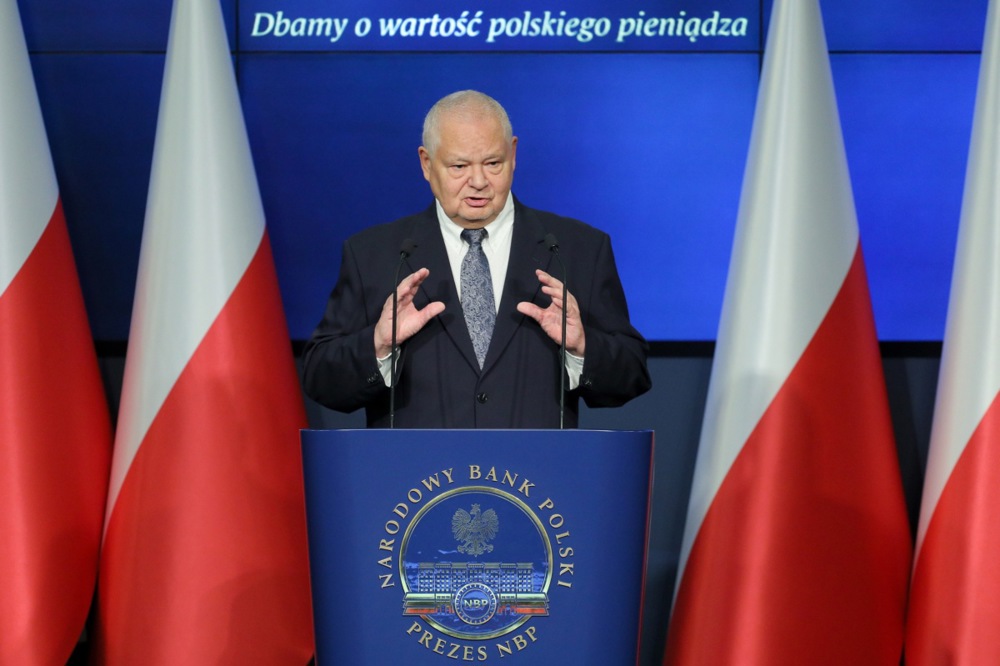European Central Bank (ECB) President Christine Lagarde has backed the head of Poland’s central bank (NBP) Adam Glapiński in a conflict with incoming Prime Minister Donald Tusk and the country’s new parliamentary majority.
That is made up of Poland’s largest opposition grouping of the Civic Coalition (KO), lead by Tusk, the Left, Poland 2050 and Polish Peoples Party (PSL).
In a letter to Glapiński, Lagarde stated that he will be protected by European Union law should the next Polish Government want to put him before a Tribunal of State for alleged failures to control inflation.
Tusk has long claimed the NBP chief acts in the interests of previously ruling Conservative PiS, including through a cut to interest rates just before the October national vote.
In late November, Tusk announced that the incoming ruling coalition was considering putting the governor before such a tribunal, which would effectively suspend him while the case was under review, for delaying an increase in interest rates in October prior to the election.
In her letter, Lagarde made clear that if such a motion were submitted to the Lower House of the Polish Parliament, leading to his automatic suspension as both head of the central bank head and as a member of the ECB’s General Council, the ECB would consider it illegal.
She said the statute of the European System of Central Banks and of the ECB, “in order to guarantee the independence of the heads of the national central banks, offers protection in case Parliament was to subsequently adopt a resolution to prosecute you”.
Lagarde added that the NBP would refer such a resolution to the Court of Justice of the European Union (CJEU) and ask for an assessment of its legality.
If that was done, the ECB would be replicating the way it handled the case of the suspension of the head of the central bank in Latvia.
In that case, as a result of a challenge from the ECB, the European Court of Justice (ECJ) in 2019 ruled that the suspension of the Latvian central bank governor was invalid because Latvia had failed to produce sufficient reasons for that decision.
According to Poland’s Constitution, the head of its central bank is nominated by the President of Poland and elected by its Parliament for a term of six years. That can only be cut short by resignation, death or successful prosecution in the Tribunal of State.
A motion to bring someone before that tribunal, a body which examines the potential wrongdoing of top state officials, may be submitted to Parliament either by the President alone or by at least 115 MPs and must be passed by an absolute majority.
If such a resolution was passed, the NBP head would be suspended and his duties taken over by the vice president of the bank.
On December 1, Tusk appeared to row back on his previous statements about Glapiński , saying that his group would not do anything to affect the stability of or undermine the reputation of Poland abroad.
On December 4, Ryszard Petru, an MP with the Poland 2050 party, told commercial radio station TOK FM that the motion to charge Glapiński was ready but there had been no political decision on the matter so far.
The reason why Glapiński’s opponents may seem to be getting cold feet over taking him and the central bank on could have something to do with the fact that they have suffered considerable embarrassment over an attempt to bring forward legislation on energy.
On November 28, MPs from the KO and Poland 2050 tabled a bill to freeze the price of electricity and gas for households until the end of June 2024 via the introduction of almost €3.5 billion levy on Polish energy giant Orlen.
On the same day Orlen, the second-largest company on the Warsaw Stock Exchange, saw its share price plunge by 8 per cent.
That lead company CEO Daniel Obajtek to protest that Orlen would now have that amount less to commit to renewable energy projects. He added that the measure was a breach of EU law as it adversely affected just one company rather than the whole sector.
The legislative draft also contained provisions facilitating wind-farm construction, which liberalised the sale of farmland and reduced the required minimum distance between wind turbines and domestic buildings.
The PiS has accused the incoming ruling coalition of having fallen prey to wind-farm lobbyists, leading to an argument within the new group over who was responsible for a project that looks to have undermined their candidate for climate and energy minister even before that person has taken up their post.
The new majority has now promised to review the legislation. That may indicate a more cautious approach to what may be potentially difficult and controversial moves – such as attempts to remove the head of the country’s central bank from office.





